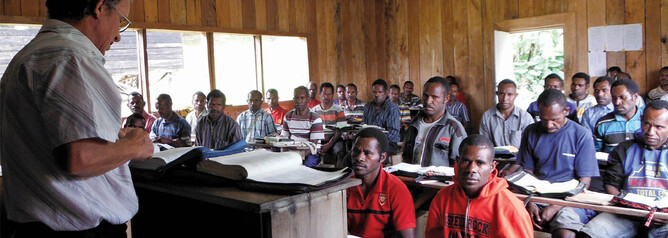Living in this fallen world, we all have stress. It may be in the home, the workplace or within the community. So why are missionaries so in need of our prayers and support? I experienced the stress of leaving all I knew, when emigrating from the city of Toronto to small-town New Zealand in my late teens. I felt that some of my roots had been ripped out, but within months, was getting used to the different culture, climate and vocabulary, had settled into a like-minded church and was making new friends. Living in this fallen world, we all have stress. It may be in the home, the workplace or within the community. So why are missionaries so in need of our prayers and support? I experienced the stress of leaving all I knew, when emigrating from the city of Toronto to small-town New Zealand in my late teens. I felt that some of my roots had been ripped out, but within months, was getting used to the different culture, climate and vocabulary, had settled into a like-minded church and was making new friends. Going from NZ and Australia to village life in Papua was a much more drastic move. The language barrier is a major factor. We need to be fluent in Indonesian and Lani (a very complicated language full of redundancies). So all day we switch back and forth among three languages, as most local people are mono-lingual. Among the local people we do have a few friendships, but our hearts grieve over the lack of burden for the lost, the youth and the children among the leadership in all the churches, so we don’t really feel ‘like-minded’ with the church leadership. Celebrating the Lord’s supper is usually avoided by the locals, so we have had to keep pushing it to get the Bible school to do it once a month. Now there seem to be more people that appreciate it.
The needs are overwhelming. There have been three wars in the area in the past six years. In the past few years two highly respected church leaders, Nanina Karoba and Ten Wandimbo, one of our Bible school lecturers, were murdered. Then with the tribal wars, over a hundred people were killed supporting their respective political party. (That didn’t hit world news.) Then another local war that started over an adultery case, mainly affecting villages across the valley five kilometres away, left four men dead and about a hundred traditional huts burnt down. The people all fear witchcraft; there is a high mortality rate; gambling and immorality abound, and AIDS is rife. The people are developing a dependency on government money (misuse of money is a whole other story).
There are no police in our area, no social welfare agencies, no Salvation Army or any other denomination, no Teen Challenge. So the care of the drunk, insane or criminals is left to the community. (When church leaders phoned the nearest police HQ requesting armed men to be sent because some violence was expected, the police replied, “Is Wesley there?” Yes. “Well let him handle it!” they said. Thankfully, the Lord enabled Wes to calm things by only having to disarm one man. Subsequently, a policeman who had come to supervise elections told Wes that they don’t worry about Mamit when Wesley is there!) While we have been away, there was an attempted break-in at the lady teachers’ dormitory at 3:00 in the morning, followed by further attempts during that week. The lady teachers are still traumatised by that event over a month later.
Mission policies of goal-achieving and assessment (I was given a score of 65% one year), the feeling that supporters want to get their ‘money’s worth’ — with a modern expectation of weekly, monthly or three-monthly reports — can add to the pressure. One church stopped sending gifts because we wouldn’t promise to attend their church to serve them when we retire. In the early days, there was poor to no medical care and we had to find our own electricity and water supplies. Wesley still has to organise those. Food supplies are limited in variety and quality. Our house is always overrun with cockroaches and rats. For us, a good week is when we have killed three rats (give or take) and have a couple of days of peace before the next round, and we have managed to keep cockroaches out of our food and drink. All that can be very wearying.
How do missionaries cope with the isolation and pressures? It can take a toll on their health, marriages and family life. In order to make it more sustainable, some keep a house in a town where they can experience good food and fellowship and only venture into the village for shorter lengths of time. Others go onto medication. We need wisdom to know what is the Lord’s will for us. Jesus walked on water, but he more often travelled in a boat. Local people have told us how they appreciated that we stayed in the village with them as they went through wars. 1 Kings 20:35-43 tells a strange story that pictures genuine wounds as necessary for service, in some cases.and fellowship and only venture into the village for shorter lengths of time. Others go onto medication. We need wisdom to know what is the Lord’s will for us. Jesus walked on water, but he more often travelled in a boat. Local people have told us how they appreciated that we stayed in the village with them as they went through wars. 1 Kings 20:35-43 tells a strange story that pictures genuine wounds as necessary for service, in some cases.
Looking back, we realise that I experienced depression for years which came to a head with frequent panic attacks. But in all of this the LORD is working and His Word is our consolation. How do I battle the depression that lurks even now? Feelings of frustration and being overwhelmed by the needs have to be battled with Scripture. Psalm 1 about ‘fruit in season’ and Isaiah 53:11, saying that Jesus will be satisfied with the result of His sacrifice, are both encouragements. Who am I to be frustrated if He is satisfied? God chose to say His reward will be, “Well done good and faithful servant!” Not a ‘goal-achieving, successful’ servant (Matthew 25).God has called us to work with ‘the least of these’ and He is the Lord of the harvest. My heart goes out to the children of the Bible school students and it is great to see their joy as I work with them. Family life is not generally good and there is a fair bit of domestic violence, so the kids respond enthusiastically to love.
We try to keep up with correspondence. Hearing that people pray for us every day is a huge encouragement. Even the apostle Paul asked for prayer – that he may be fearless in declaring the gospel (Ephesians 6:19), that there will be an open door and the message will be clear (Colossians 4:3,4), that the message of the Lord may spread rapidly and be honoured and we be delivered from wicked men (2 Thessalonians 3:1,2). We would echo those requests.MAF and our mission colleagues have been wonderful supports, corresponding and sending treats or coming for weekend visits, and we enjoy sharing a meal together when we are at the coast for resupplying. One of the children of a MAF family has become a ‘pen pal’ and is collecting Esther’s letters and drawings. Humour helps as we describe incidents like the rat falling under my dress and running around until finally finding the exit of the neckline.
We are very God-dependent, which is a good thing. We need wisdom to know what to do and what to leave undone. We don’t want to do more than, less than or other than God’s will. Our parents kept all of our letters from the 1980s and 1990s, but reading them again is too distressing. Still, we have met Lani people who call us ‘mum and dad’ and say how much we meant to them during that time. The Lani Bible translation is a daily trophy of the Lord’s grace, written during those dark days. Praise the Lord.
During one terrible time, 1 Corinthians 15:58 came to me so strongly that I wrote it on the wall. “Be steadfast immovable, always abounding in the work of the Lord for you know that your labour is not in vain, in the Lord.” Only eternity will reveal all that God is doing and how you have helped us by your prayers.
by Esther and Wes Dale

